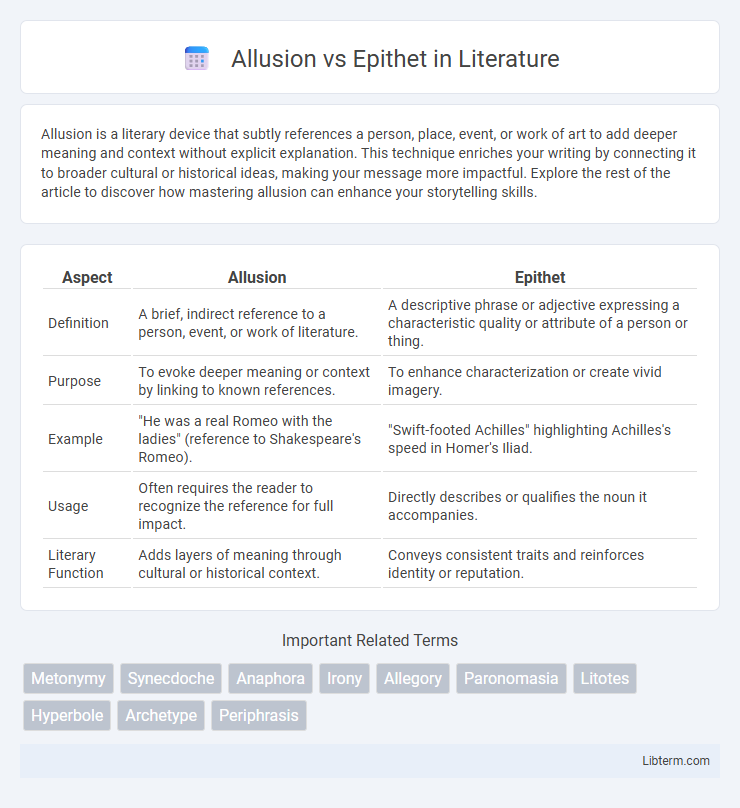Allusion is a literary device that subtly references a person, place, event, or work of art to add deeper meaning and context without explicit explanation. This technique enriches your writing by connecting it to broader cultural or historical ideas, making your message more impactful. Explore the rest of the article to discover how mastering allusion can enhance your storytelling skills.
Table of Comparison
| Aspect | Allusion | Epithet |
|---|---|---|
| Definition | A brief, indirect reference to a person, event, or work of literature. | A descriptive phrase or adjective expressing a characteristic quality or attribute of a person or thing. |
| Purpose | To evoke deeper meaning or context by linking to known references. | To enhance characterization or create vivid imagery. |
| Example | "He was a real Romeo with the ladies" (reference to Shakespeare's Romeo). | "Swift-footed Achilles" highlighting Achilles's speed in Homer's Iliad. |
| Usage | Often requires the reader to recognize the reference for full impact. | Directly describes or qualifies the noun it accompanies. |
| Literary Function | Adds layers of meaning through cultural or historical context. | Conveys consistent traits and reinforces identity or reputation. |
Introduction to Allusion and Epithet
Allusion is a literary device that references a well-known person, place, event, or work to evoke deeper meaning without explicit description. An epithet is a descriptive phrase or adjective expressing a characteristic quality or attribute of the person or thing mentioned. Both enrich text by adding layers of significance, with allusions drawing on external contexts and epithets enhancing the understanding of characters or objects within the narrative.
Defining Allusion: Meaning and Features
Allusion is a literary device that references a person, place, event, or work of art, often indirectly, to convey deeper meaning or context without explicit explanation. Its features include brevity, implied connection, and reliance on the reader's prior knowledge to recognize the reference. Unlike epithet, which directly describes a character through descriptive phrases, allusion enriches text by drawing on external cultural or historical elements.
Defining Epithet: Meaning and Features
An epithet is a descriptive term or phrase expressing a characteristic quality or attribute of a person, place, or thing, often used to enhance or highlight a specific feature. It functions as a concise, vivid adjective or nickname, such as "Alexander the Great," where "the Great" emphasizes exceptional leadership and achievements. Unlike allusion, which references external work or context, an epithet directly qualifies the noun to create a strong, memorable impression.
Historical Origins of Allusion and Epithet
Allusion and epithet both derive from ancient rhetorical and literary traditions, with allusion rooted in classical Greek and Roman texts where indirect references to mythology, history, or literature conveyed layered meanings. Epithet originated from Homeric poetry, serving as descriptive phrases attached to names to highlight distinct attributes, such as "swift-footed Achilles." The historical origins of allusion emphasize intertextuality and cultural literacy, while epithets functioned as mnemonic and character-defining devices in oral storytelling.
Key Differences: Allusion vs Epithet
Allusion refers to an indirect reference to a person, event, or work of literature, enriching the text by invoking external meanings without explicit explanation, whereas epithet is a descriptive phrase or adjective that highlights a characteristic quality of a person or thing. The key difference lies in allusion's reliance on external cultural or historical knowledge to create depth, while epithet functions as a direct attribute emphasizing identity or traits. Allusions often enhance thematic complexity, while epithets contribute clarity and vivid imagery in character or object portrayal.
Similarities Between Allusion and Epithet
Allusion and epithet both enrich a text by invoking additional meaning without lengthy explanations, allowing writers to convey complex ideas efficiently. Each relies on the reader's familiarity with cultural, historical, or literary references to enhance understanding and emotional impact. Both devices function as tools to create vivid imagery and deepen the reader's engagement through subtle yet powerful connotations.
Functions in Literature and Rhetoric
Allusions enrich literature and rhetoric by referencing well-known cultural, historical, or literary figures and events, invoking shared knowledge to add depth and resonance without lengthy exposition. Epithets function as descriptive phrases or adjectives that characterize and emphasize particular traits of a person, object, or concept, enhancing the vividness and memorability of the narrative. Together, allusions and epithets serve as powerful rhetorical devices that create layers of meaning and engage readers' imagination and understanding.
Examples of Allusion in Classic Works
Allusion in classic works often references cultural, mythical, or historical figures to evoke deeper meaning, as seen in Shakespeare's "Julius Caesar" where Cassius alludes to the fable of the "barren sceptre" to signify weak leadership. In Homer's "The Odyssey," frequent allusions to the gods and mythical heroes enhance the epic's grandeur and connect the narrative to broader Greek mythology. By contrast, epithets in classics like Homer's "Iliad" use repetitive descriptive phrases such as "swift-footed Achilles" to characterize and emphasize traits directly.
Examples of Epithet in Classic Works
Epithet is a literary device that involves using descriptive phrases or adjectives to characterize a person or thing, such as Homer's "rosy-fingered dawn" in *The Iliad* or Shakespeare's "star-crossed lovers" in *Romeo and Juliet*. Unlike allusion, which references external works or events indirectly, epithets are inherent attributes that highlight essential qualities or symbolic traits within the text itself. Classic works heavily rely on epithets to reinforce themes and character identities, as seen with the "swift-footed Achilles" and "wine-dark sea" in ancient Greek epics.
Choosing Allusion or Epithet: When and Why
Choosing between allusion and epithet depends on the desired literary effect and context; allusion subtly references a well-known person, place, event, or work to evoke deeper meaning, while epithet directly characterizes someone or something with a descriptive phrase or adjective. Use allusion when aiming to enrich the text with cultural or historical resonance, allowing readers to draw connections and infer significance beyond the literal. Employ epithet for concise, vivid characterization that reinforces traits or qualities, enhancing imagery and emotional impact without requiring background knowledge.
Allusion Infographic

 libterm.com
libterm.com